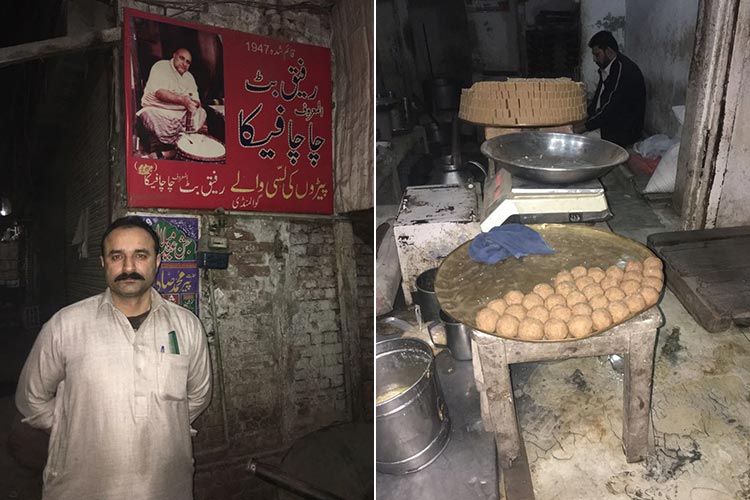Written by: Ibrahim Younus
Posted on: May 31, 2018 |  | 中文
| 中文
Centre Square of Gawalmandi Food Street
With passing time, the landscape of the majestically charming city of Lahore has transformed. Centres have significantly shifted and historical focal points have disappeared from the memories of the inhabitants of the heart of Punjab.
A victim of this societal reorientation is Gawalmandi Food Street. Ousted by its younger brother, the Fort Road Food Street which boasts some fantastic restaurants and stunning views of the Lahore Fort and the Badshahi Mosque, this fallen icon pleads to those who pass by to glimpse what it has to offer. Unique in securing its place as a residential community by 1911, Gawalmandi was the first area developed outside the Walled City of Lahore. The people who migrated to this area were motivated by the paucity of jobs, so they set up food stalls to generate income for themselves and their families. Sikhs brought with them their traditional fried fish, now known as ‘Sardar Fish,’ while the Kashmiris brought their delicious Hareesa. Thus, the legendary Gawalmandi was born.
From 2000 to 2012, the area was at its zenith with national and international tourists considering it a must-visit attraction of Lahore. Now, the area comes to life more at night, when there is a deafening buzz of the crowd. Families and friends alike gather at the main square. They sit at the assembled tables and gulp down tea until sleep consumes them. It is here that I meet the owner of a food stall selling various snacks, of which the star is the classic Nan Khatai served with scalding hot tea. Abdul Azeem, the son of a doctor, recalls how he and his five brothers struggled after their father’s death. Now Azeem, who is 60 years old, looks back and is grateful for a successful business.
The inhabitants of this area are proud of what Gawalmandi has given them and they know these streets like the back of their hand. While the food businesses suffered a setback in 2012, after news of rat infestation spread, they have since worked on price and quality control. Despite a decrease in international tourists, there are enough local customers to sustain the businesses. After conversing with a few residents, it becomes clear that they are more than satisfied with their neighbourhood, and Usman remarks, “This is where I was born and this is where I will die. I can identify with the people here, and I would wish for nothing else but to spend my life with them.” Others bear witness to the sense of community and tradition that binds them, as one resident proudly declares that he lives in the same compound his grandfather lived in, after he fled to Pakistan at the time of independence.
Although the overall standard of the food sold by the enthusiastic vendors is incredibly high and the one that particularly stands out is Feekay ki Lassi. One of the hallmarks of Punjabi culture is lassi and nowhere is the legacy of this drink more honoured than at Chacha Feekay ki Lassi. The owner is a dignified middle aged Kashmiri, Shahid Butt. An educated man, Shahid puts in a twelve hour shift everyday to quench the thirst of his loyal customers. For him, serving this popular beverage is a matter of honour, a practice his father and grandfather adhered to. Like many shops in Gawalmandi, this one stays open 22 hours a day. Shahid cheerfully says that a gruelling routine does not dissuade him from continuing what was started long before he was born. He says, “This business has been running for four generations. After I retire, I will pass it on to my sons.” He serves lassi with a paira on top (a ball formed when milk has fully evaporated) which separates his lassi from that sold at other shops.

There are others like Shahid in Gawalmandi, for whom their profession is more than just a means of livelihood; it’s a way of life. The spirit of camaraderie and hospitality among the residents is a unique experience in today’s fast paced and impersonal world. It seems that time has stood still in this community, and I was touched by the simplicity of these people. Gawalmandi may be living on in the shadow of its self-proclaimed superior brother, Fort Road Food Street, but it has not lost its rustic charm because of the sense of continuity, as generation after generation keep running the business of their forefathers.
You may also like: